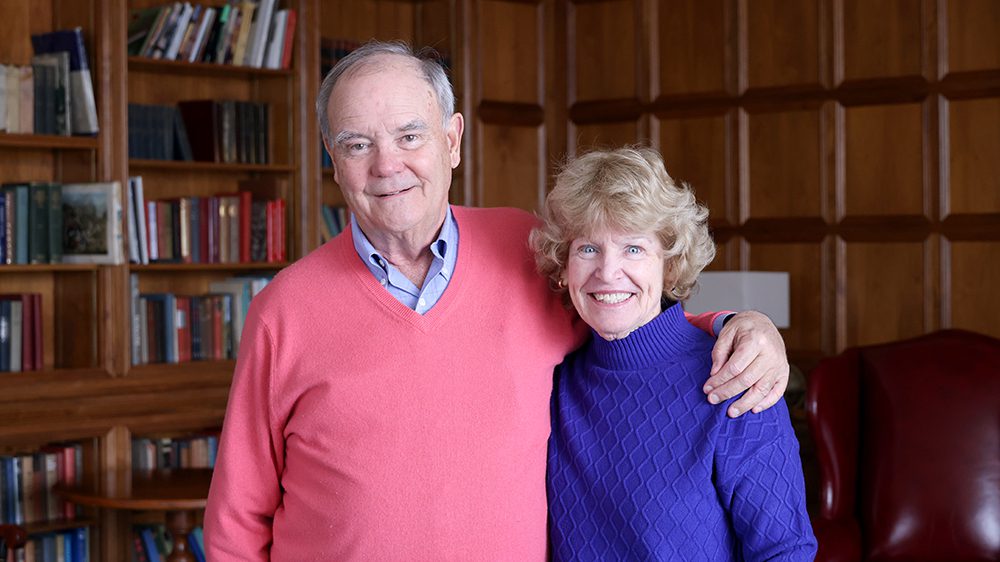Pappas-Foster ’72 Biology Fund Will Help Cadets

Chris Foster ’72, M.D., and his wife, Betsy, established the Pappas-Foster ’72 Biology Fund to support cadets studying biology at VMI.—VMI Alumni Agencies Photo.

Chris Foster ’72, M.D., and his wife, Betsy, established the Pappas-Foster ’72 Biology Fund to support cadets studying biology at VMI.—VMI Alumni Agencies Photo.
“It doesn’t take all that much money to keep a kid in school.” That’s what Chris Foster ’72, M.D., has to say about the Pappas-Foster ’72 Biology Fund, which he established in 2022 with the goal of helping cadets majoring in biology remain at the Institute if their financial circumstances change. The fund can also be used to support many different kinds of opportunities for cadets, such as study abroad, academic travel, laboratory support, and more.
Foster, a retired orthopedic surgeon and former professor of orthopedic surgery at Virginia Commonwealth University, believes that helping deserving young people reach their goals is in the best interests of not only VMI and the youths themselves but also the nation, as the number of college-age young people is near a historic low.
“The way that schools like VMI can potentially compete to first, enroll, and second, keep the students they’d like to have, is by having financial aid,” Foster stated. “And this fund is a way to support the school and the department.”
Now a resident of Midlothian, Virginia, Foster grew up in the small Southside Virginia town of Martinsville as the son of a physician, and from a very young age, he knew he wanted to follow his father into the medical profession. His father’s best friend was Harold “Lefty” Williams, Class of 1931, now in the VMI Sports Hall of Fame, and it was Williams who first introduced the young Foster to VMI by bringing him along to Keydet football games.
As a high schooler, Foster did fairly well overall academically, but trouble in an Algebra II class led to a summer session at Hargrave Military Academy near Martinsville, and it was during the enforced study sessions there that Foster began to realize how much a structured environment helped him. VMI was then the natural choice, despite the pull of state schools, where relationships with women and an active social life were more of a possibility. With his long-term goal in mind, though, Foster committed to VMI. “I showed up minute one planning to major in biology and go to medical school,” said Foster of his plan upon arrival at the Institute.
Throughout his cadetship, Foster benefited from two key aspects of the biology department that are still hallmarks of the department and the Institute today: Small class sizes and direct mentorship from professors. He fondly recalls Col. Oscar Gupton, Ph.D.; Col. Fred Swope, Ph.D.; and Col. Louis Hundley ’47, Ph.D., as being particularly influential, along with Col. Robert “Bob” Ludt, Ph.D., who taught chemistry. “They were really, really good people,” said Foster of those faculty members and others teaching in the department at the time. But those professors, Foster recalled, weren’t above having a straight talk with a cadet when they felt it warranted.
“Colonel Hundley was also my faculty advisor, so he would not hesitate to say, ‘Mister Foster, you see me after class,’” Foster recounted. Oftentimes, he noted, Hundley’s words would be, “You can do better than this. You’re not working at this as hard as you need to work at this. You’re skating by. You need to get with it.”
“The Pappas-Foster ’72 Biology Fund will fill a void, allowing us to directly support cadets in financial need.”
Col. Ashleigh Smythe, Ph.D., VMI biology department head
As a 1st Class cadet and a 1st Class private, Foster served as president of the Honor Court—and his best friend, Lou Pappas ’72, was a prosecutor. Pappas was also a fellow biology major and would go on to earn the First Jackson-Hope Medal at graduation for having the highest grade point average in the class.
After graduation, both Foster and Pappas attended medical school, Foster at the Medical College of Virginia and Pappas at the University of Alabama at Birmingham. Pappas then began practice in his native Birmingham and chose one of medicine’s most demanding areas, pulmonary and critical care, which often involves the treatment of patients on ventilators in the intensive care unit. Foster described Pappas’ job as “the most difficult of the medical specialties.”
As the decades rolled on, Foster and Pappas remained in touch and part of each other’s lives. The two took a fly-fishing trip to Montana, and Pappas attended the Foster daughters’ weddings.
Then, around Christmas 2008, Pappas abruptly stopped communicating with Foster. In March 2009, Foster received the dreadful news that Pappas had died by suicide. Familiar with the literal life-and-death demands of the medical profession, Foster views Pappas’ passing with empathy. “I believe that if you have not faced that degree of despair, you really probably cannot understand it,” he stated.
When he first graduated from VMI, Foster stayed away from post until his 10th Reunion. After that reunion, he began to give regularly, and by the time his 50th Reunion rolled around in 2022, he was starting to think about a way to give back more substantially. When he mentioned his interest to his friend John Fick ’72, a member of the Foundation Board of Trustees, Fick put him in touch with Joe Irby ’85, then a VMI Alumni Agencies major gift officer, and Irby came to visit Foster and his wife, Betsy, at their home.
After Irby had departed, Betsy Foster turned to her husband and said, “We’ve saved more money than we’re going to spend. Is there anything you want to do?” Immediately, Foster began to think of his departed friend and the excellent preparation both he and Pappas had received in VMI’s biology department.
“Lou and I were very, very, very close,” Foster related. “And so I asked Joe, ‘How much does it take to start a fund?’”
Soon, Foster met with Col. Wade Bell, Ph.D., then-head of the biology department, and plans for the Pappas-Foster ’72 Biology Fund began to take shape. “Every year, we’ve got kids who leave school for what really is not an awful lot of money,” Foster recalls Bell telling him. Not wanting to compete with the Carroll Fund, which supplies equipment and other operational funds for the biology department, Foster crafted the language surrounding his fund so that it would directly benefit cadets in need.
“We’d like to support the school and the department to attract and keep the quality student that they would like to have, and that is the goal of this fund,” Foster explained. “This is an opportunity to pool your money and help cadets.”
Current head of the biology department, Col. Ashleigh Smythe, Ph.D., is grateful for the Fosters’ generosity. “The Pappas-Foster ’72 Biology Fund will fill a void, allowing us to directly support cadets in financial need,” she said. “The fund can also augment enrichment activities such as research at another institution or study abroad.”

The development writer plays a key role in producing advancement communications. This role imagines, creates, and produces a variety of written communication to inspire donors to make gifts benefiting VMI. Utilizing journalistic features and storytelling, the development writer will produce content for areas such as Annual Giving, stewardship, and gift planning.